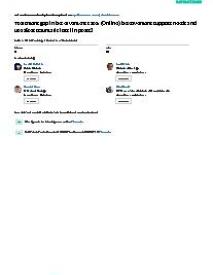Treatment gap in bereavement care : (Online) bereavement support needs and use after traumatic loss
People bereaved through road traffic accidents (RTAs) are at risk for severe and disabling grief (i.e., pathological grief). Knowledge about needs and use of bereavement care, including psychotherapy, pharmacotherapy, and support groups is limited. This study charted (correlates of) the needs and use of bereavement care in RTA bereaved people. Furthermore, while online grief treatment seems effective, it is unknown whether it is perceived as acceptable. Accordingly, we examined the acceptability of online treatment. Dutch RTA bereaved adults (N=273) completed self-report measures about needs and use of bereavement care, acceptability of online grief treatment, and pathological grief.
Regression analyses were used to identify correlates of care needs and use and acceptability of online treatment. The majority (63%) had received help from psychotherapy, pharmacotherapy, and/or support groups. One in five participants had not used bereavement care services, despite reporting elevated pathological grief levels and/or expressing a need for care, pointing to a treatment gap. Use of psychological support before the loss was the strongest predictor of bereavement care needs and use following the loss. A minority (35%) reported being inclined to use online grief treatment if in need of support. More openness towards online services was related to greater acceptability of online treatment. In conclusion, 20% of RTA bereaved people with pathological grief or care needs had not received care. This treatment gap may be reduced by improving accessibility of online treatments. However, as only 35% was open to using online treatments, increasing the acceptability of (online) treatments appears important.
Key Practitioner’s points
• This is the first study examining self-reported use of psychotherapy, pharmacotherapy, and support groups in traumatically bereaved people.
• Psychotherapy was the most frequently used service (55%), followed by pharmacotherapy (30%), and attending support group meetings (23%).
• One in five participants had not used bereavement care services, despite reporting elevated pathological grief levels and/or expressing needs for care.
• One third of the participants perceived online grief treatment as acceptable.
• More openness towards innovative online services and higher pathological grief levels were related to increased acceptability of online grief treatment.
Geachte bezoeker,
De informatie die u nu opvraagt, kan door psychotraumanet niet aan u worden getoond. Dit kan verschillende redenen hebben,
waarvan (bescherming van het) auteursrecht de meeste voorkomende is. Wanneer het mogelijk is om u door te verwijzen naar de bron
van deze informatie, dan ziet u hier onder een link naar die plek.
Als er geen link staat, kunt u contact opnemen met de bibliotheek,
die u verder op weg kan helpen.
Met vriendelijke groet,
Het psychotraumanet-team.
In: Clinical Psychology & Psychotherapy ; ISSN: 1099-0879 | 28 | 4 | july/augustus | 907-916
https://doi.org/10.1002/cpp.2544


